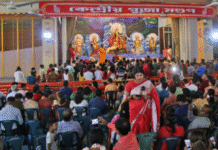
As part of an awareness campaign for uninterrupted movement of elephants, UNHCR and IUCN have installed a cut-out image of an elephant at a Rohingya camp set up by cutting trees in the forested hills of Ukhia, Cox’s Bazar, which was earlier an abode of wild elephants. — Ershad Kamol
Bangladesh have already lost forest resources of about Tk 1,800 crore for hosting Rohingyas at Ukhiya and Teknaf upazilas in Cox’s Bazar, according to a Forest Department report.
The report was submitted to environment, forest and climate change ministry by chief conservator of forests Mohammad Shafiul Alam Chowdhury in March.
It estimated the loss of Tk 456.08 crore for disappearance of trees of 6,163.5 acres of hilly land for building 30 makeshift camps and Tk 1,400 crore in ecological damages.
It showed that 6,163.52 acres of forests, including, 4,136.02 acres of natural forests and 2027.50 acres planted forests, on the hills were razed for making 2,12,607 makeshift shelters, 30km roads, 8,524 water sources, playing grounds, offices, schools and other infrastructure for Rohingyas at Ukhiya and Teknaf.
Chittagong University forestry professor Mohammad Kamal Hossain and Dhaka University geography and environment professor AQM Mahbub, however, observed that the loss would be manifold if the total environmental impact was assessed through a detailed study.
‘Ecological damages for destruction of forests and hills have a series of impacts at local, national, regional and global levels. None can revive the chain by paying money,’ Mahbub said.
Cox’s Bazar south divisional forest officer Humayun Kabir said that he estimated the ecological loss at Tk 1409.48 crore calculating 35 components, including increase in carbon emission, fall of oxygen and their impact on animals.
‘Loss for cutting hills was not calculated and I am not an expert to measure such losses,’ he said.
The report also expressed concern about bigger losses in future unless felling of trees and cutting of hills were not controlled.
A UNDP study launched in October 2018 forecasted disappearance of 26,000 hectares (64247.399 acres) of forestland within the 10km radius of the Rohingya camps in a year if the Rohingyas were not provided with alternative fuel for cooking.
The study revealed that Rohingyas used 6,800 tonnes of firewood collected from forests a month, and each family used about 60 culms of bamboo to build shanties.
Local people said that about 40 hills were cut for developing infrastructure since the beginning of the Rohingya influx in August 2017.
They said that after the construction of offices, roads and camps for Rohingyas the adjacent areas became hotter than before.
‘After developing the Rohingya camps the place became hotter than before,’ said Abdur Rahman, a 62-year man of Ukhiya.
Geography professor AQM Mahbub explained it as a heat-island effect created for deforestation and high level of carbon emanation from breathing and cooking for such a huge population at a small place.
‘It’s quite natural that the place will become hotter. For razing hills for making shelters and deforestation for cooking, erosion and land slide will increase while groundwater table will fall. All these factors have serious and multi-dimensional impact,’ he said.
Forestry professor Mohammad Kamal Hossain said that before the establishment of camps, he used to take students to natural forests at Ukhiya for showing them trees like bailam, civit and bashpata, which are at the verge of extinction.
‘There were some mother trees of such species through which different organisations used to breed trees. But, these valuable trees do not exist. Such loss cannot be counted,’ he said.
Replacement of trees by shanties also hampered route for elephants in the area, Kamal said. ‘The elephants will attack the Rohingyas and will never come to the place,’ he said.
Local people said that elephants attacked places in the camp areas recently and killed 12 Rohingyas.
UNHCR made an office in front of an indicator board showing elephant movement at Kutupalang camp at Ukhiya.
Forest secretary Abdullah Al Mohsin Chowdhury said that the ministry had already discussed about Forest Department report with the development partners and sought help for plantation in the area.
‘We are also considering conducting an in-depth study on the environmental loss,’ he said.
Refugee relief and repatriation commissioner Mohammed Abul Kalam said that alternative fuel distribution programme was initiated to control deforestation.
‘We told the international community that we endured serious environmental loss just for humanitarian ground of hosting about 10 lakh Rohingyas,’ he said.
More than 7,20,000 Rohingyas, mostly women, children and aged people, entered Bangladesh fleeing unbridled murder, arson and rape during ‘security operations’ by Myanmar military in Rakhine, what the United Nations denounced as ethnic cleansing and genocide, beginning from August 25, 2017.
Source: New Age.









